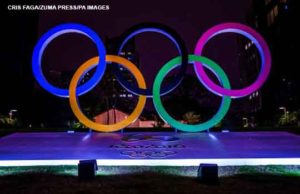
A few days ago I was in nominal charge of the second field of play team which is situated after the finishing line of the track. The finishing line is fixed as it has all the photo and electronic equipment on it, and starts are arranged variously according to the event’s length. I say I was in nominal charge, because I asked my Brazilian GP colleague to hold the leader’s radio, as my Portuguese would be inadequate if I needed to use it. We had all our kit and went through a rehearsal of using the spinal board, basket stretcher, and trolley for a collapsed person. We also went through the emergency bags we carry, the airway kit, folding splints, bandages and so on. I am reassured that my colleagues and I can work together through the international language of medicine.
Our chief is an orthopaedic surgeon with international experience, and he is also an athletic competitor. He warned us that our shift included the steeplechase and the triple jump—two of the most dangerous athletics disciplines after the pole vault. Both have a significant risk of lower limb injury, sometimes severe, but although we did have an incident, no one was injured and it allowed a competitor to show the highest competitive Olympic spirit.
We were one of four field of play teams in the park. A low hurdle for the steeplechase race was in our sector and right in front of us. Unlike hurdle sprints, all the runners use the same hurdle, and that is where there is a risk of accident, usually when someone trips on the hurdle, or on landing. At one point several runners collided and fell, but although we were out of our seats, the runners all got up again. But one had lost her shoe and putting it back on would waste too much time, so she threw it away and raced on, finishing the race that way to enormous cheers from the crowd.
Our session also included eight heats for the 100m, but only in the last did we see the Olympic champion, the Fastest Man on Earth, Usain Bolt,who just strolled to win his heat, as he should. But another runner in one of the heats must have tried beyond his ability and collapsed once over the finishing line. This was in the sector of our colleagues in the first field of play team, who packaged him into the stretcher and trolley, and off to the medical centre in no time, where I’m told he recovered and was able to walk out and back to his home team.
**************************
Another day in the stadium, or rather, night as this was a late shift, and we had just seen one of the climaxes as Usain Bolt took gold, again. His tour of triumph around the stadium seemed to take forever, but after we brought in our kit, and cleared up the base, we realised that he had just started.
I’ve mentioned the tension that the athletes suffer, their stress relieving jogs and jigs as they wait to perform. I was the base doctor when a call came in that an athlete was on their way with abdominal pain and vomiting. They were still in competition so I got the reminder to be cautious about drug treatment.
The things you give up for medicine—I was watching Andy Murray, five sets all and deuce in the final gold medal game, when our casualty arrived. This runner was fresh from a heat, and all they wanted to do was lie on our nice cool floor and retch, but a rapid history and examination excluded abdominal pathology. Persuaded that they would soon get cold, we got them on to a trolley and under a blanket, when secondary survey found nothing save rapid breathing. A short relaxation exercise restored normality—it was “just” the stress of the highest level of athletic competition, and as we handed them back to their anxious, but relieved coach, I got a hug and a “pin.”
Pins are small brooches, originally team and country identifiers in the days before massive security, and have become a way that athletes thank volunteers for their services. Physios have lanyards weighed down, medics don’t get many, so I shall treasure mine!
John Davies is a consultant anaesthetist in Lancaster, who takes part in motorsport as a competitor and as a rally doctor.
Competing interests: I have read and understood BMJ policy on declaration of interests and I have no financial or other competing interest in the Olympic Games.
